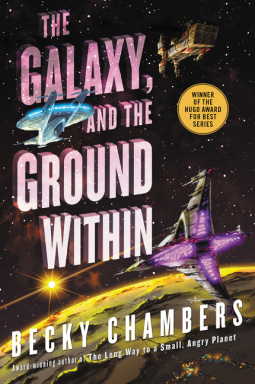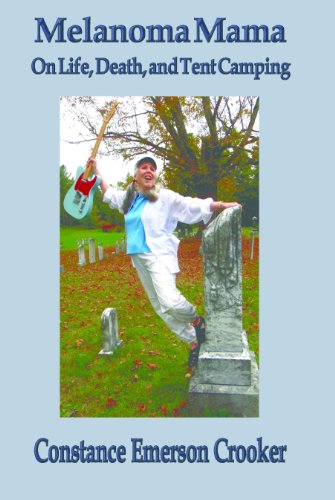Monday, December 16, 2024
In Troubled Times: Bouncing Off the Bottom
Monday, July 31, 2023
Writerly Support Goes Both Ways
Some years ago, I struck up a conversation with a young writer at a convention. (I love getting to know other writers, so this is not unusual for me.) One thing led to another, led to lunch, led to getting together on a regular basis, and led to frequently chatting online. I cheered her on as she had her first professional sale and then another, and then a cover story in a prestigious magazine. One of the gifts of such a relationship is not the support I receive from it, but the honor and joy of watching someone else come into her own as an artist, to celebrate her achievements. It's the opposite of Schadenfreude -- it's taking immense pleasure and pride in the success of someone you have come to care about.
Friday, March 4, 2022
Short Book Reviews: Creating Alien Community
The Galaxy, and the Ground Within, by Becky Chambers (Harper Voyager)
Set on an uninhabitable planet whose only value is as a
stopover for other worlds, this story explores what happens when members of
very different species and histories are forced into community when they are
temporarily cut off from contact with the larger Galactic Commons. Three of
these strangers are guests at the overwhelmingly hospitable Five-Hop One-Stop
version of a spacer’s truck stop when a freak accident halts all traffic and
communications. At first glance, they have little in common: an exiled artist
with an urgent, perhaps redemptive appointment to keep, a cargo runner with a
military history at a personal crossroads, and a mysterious individual who
cannot leave her space suit but is doing her best to help those on the fringes.
Add to this odd grouping, their host and her teenager, furred quadrupeds that
reminded me repeatedly of space otters. Most of all, though, this book is about
how people who are initially not only diverse but at odds with one another can
bridge those differences through understanding and shared experiences to form
friendships and, ultimately, community.
Monday, November 22, 2021
Memoir, Cancer, And Tent Camping: My Friend Connie
When a friend or family member is diagnosed with cancer, the effects ripple through the community. If we and our friend are relatively young, we may feel shock but also a sense of insulation. We have not yet begun to consider our own mortality, or the likelihood of losing our peers to accident or one disease or another. It hasn’t happened to us yet and the odds are still in our favor, particularly if we don’t smoke or drive drunk, we exercise and eat many leafy green vegetables. As the years and the decades go by, most of us will see an increase in morbidity if not mortality in our friends. They – and we – may develop osteoarthritis or Type 2 diabetes, high blood pressure, high cholesterol, all those common ailments of aging.
Some of us will get Covid-19. Some of us will get cancer.
“So now, I’m back to scans every three months. Watch and wait. Watch and wait. Wait for the pink and turquoise sneaker to drop. But I keep enjoying my miraculous recovery.“When I say miraculous, I don’t mean a conventional miracle. … It’s miraculous that a Monarch butterfly can wing its way from Canada to one small patch of breeding ground on a Michoacan hillside. It’s miraculous that a black hole’s sucking gravity can pull everything, including light into is gaping maw. It’s miraculous that there are billions of stars in our galaxy and billions of galaxies in our universe…“And I’m still here, gazing with wonder at it all.”
Friday, September 17, 2021
Short Book Reviews: A Skunk, a Badger, a Magical Egg, and A Chicken on a Mission
Egg Marks the Spot (Skunk and Badger 2), by Amy Timberlake (Algonquin Young Readers)
I adored the introduction of Skunk and Badger (Skunk and Badger), at first unwilling housemates, who become fast friends. Badger is a fussy, hyper-organized Important Rock Scientist who resents any interruption of his routine, while Skunk is expansively friendly, speaks to cryptic chickens, and cooks gourmet meals. Skunk’s one obsession is the New Yak Times Book Review. That’s really all a reader needs to know before embarking upon their next adventure: a camping trip. The trip proceeds along hilarious lines, with Badger calculating the exact weight of every multi-purpose article in his neatly organized pack, and Skunk throwing in pots and pans, fresh produce, and other items on which usefulness he and Badger disagree profoundly. This, then, is the essence of their friendship: how the differences supply each other’s blind spots.Needless to say, the camping trip quickly takes several unexpected turns with an obnoxious bully from Badger’s past, an incredible find in a cave, the secret mission of chickens, a bivalve moving company, and much, much more. The characters are endearing, the action lively, the prose deliciously inventive, and the deeper themes of friendship, loyalty, and courage shine through.
A splendid book for the whole family to read aloud!
Saturday, March 17, 2018
Remembering Mary
Deborah Ross introduced herself to me at the first Science Fiction conference I ever attended in Portland, way back in, hmmm, must have been 1989, right after I’d started selling my short stories and showing up in the reviews as a ‘hot new writer.’ The ‘new’ part was certainly true and I was so flattered when this established author introduced herself and had clearly heard of me. We’ve been good friends ever since, through the ups and downs of our personal lives and our careers.
 Mary and I used to joke that we were 2/3 of the Reed College
Alumni Society of Science Fiction Writers, the other 1/3 being David Eddings.
That’s changed over the years as more Reedies have ventured into the genre, but
was worth a giggle or two.
Mary and I used to joke that we were 2/3 of the Reed College
Alumni Society of Science Fiction Writers, the other 1/3 being David Eddings.
That’s changed over the years as more Reedies have ventured into the genre, but
was worth a giggle or two.Monday, February 1, 2016
Monday Wisdom From Ralph Waldo Emerson
Thank you, my wonderful friends, for carrying me through times so dark I could not stand, let alone walk.
Wednesday, October 23, 2013
The Writing Life: Re-entry and Changing Gears
Friday, October 11, 2013
ARCHVES: Murder, the Death Penalty, and Cancer
Twenty-five years ago, my mother was raped and beaten to death by a teenaged neighbor on drugs. My mother was 70 years old and had been his friend since the time he was a small child. For a long time, I didn't talk much about it except in private situations. This was not to keep it a secret, but to compartmentalize my life so I could function. At first, it was too difficult and then, as the years passed, I refused to let this single incident be the defining experience of my life. Recently, however, I have felt inspired to use my own experience of survival and healing to speak out against the death penalty. I don't write this to convince you one way or another on that particular issue, but to try to illuminate how the two issues are related for me.
My mother's murder was a spectacularly brutal, headline-banner crime, but it was only part of a larger tragedy, for the perpetrator's family had suffered the murder of his older brother some years before. I knew this, but for a long time it didn't matter. My own pain and rage took center stage. But with time and much hard work in recovery, I came to the place of being able to listen to the stories of other people.
We all lose people we love. Tolstoy wrote that happy families are all alike, but every unhappy family is unhappy in its own way. I would interpret that to mean that each loss, each set of relationships and circumstances is unique, but there are things we share.
What might it be like if one family member were murdered -- and another family member had killed someone? What does it feel like to watch the weeks and days pass while the execution of someone you dearly love draws ever nearer? How can we wrap our minds around loving someone and accepting that they have caused such anguish to another family? I've had a chance to talk with people in all these circumstances. It's been a humbling experience.
Saturday, October 5, 2013
Friendship as living water
Friday, September 27, 2013
Winding Down To A Still Point
Friday, September 13, 2013
A Community of Love
Wednesday, September 11, 2013
World-Building, Dying, and the Memory Lane of Comfort Foods
Saturday, September 7, 2013
Don't Hurry Up
 |
| Photo by Cleo Sanda |
Thursday, September 5, 2013
Year-End Gifts
Friday, December 30, 2011
Living Now With Cancer
Tuesday, October 25, 2011
The Lady (Actual and Honorary) Writers' Lunch
One of my secret weapons against the perils of isolation is the writer's lunch. When I lived in Los Angeles, I joined my first critique group, an eclectic mix of sf/f writers, mystery writers, and mainstream "literary" writers, with a core of Clarion and UCLA Advanced Writing class graduates. One of the other sf/f writers and I started going to lunch once a month or so. The group meetings were tightly focused on critiquing manuscripts and there wasn't much time for schmoozing about general writing issues, nor was the group atmosphere hospitable to sf/f shop talk. I quickly learned the value of having a writing buddy, someone to cheer me on, help me choose markets, analyze the personalities of editors, commiserate with about rejections (and try to interpret those letters), and more.





